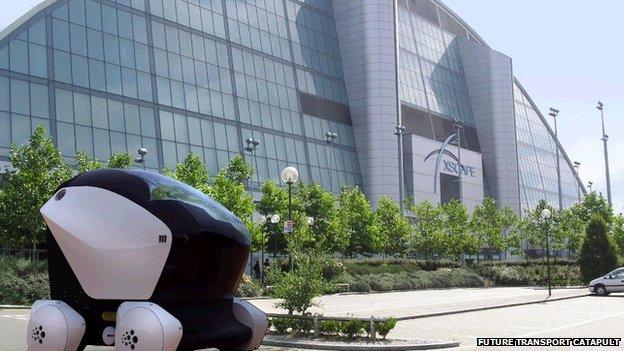Tomorrow's Buildings: Radical solutions to housing crisis
- Published
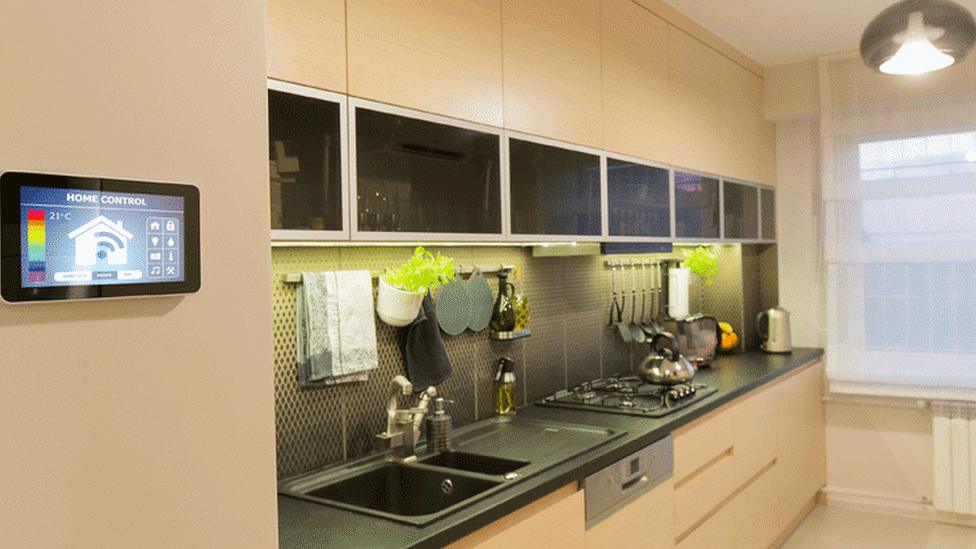
Technology to make homes smarter is only useful if you have the home you want in the first place
For many, a smart home is not one that has a thermostat that responds to their temperature needs, a door lock that knows they are coming up the drive, or even a fridge that knows when they have run out of milk.
Instead it is one that is comfortable, affordable and in the right location.
Unfortunately for many that remains a distant dream, begging the question - can technology play a role in making housing more affordable and better suited to our needs?
Alastair Parvin certainly thinks so. He is the brains behind the WikiHouse, an open source building system which aims to give people the digital tools to create cheap homes.
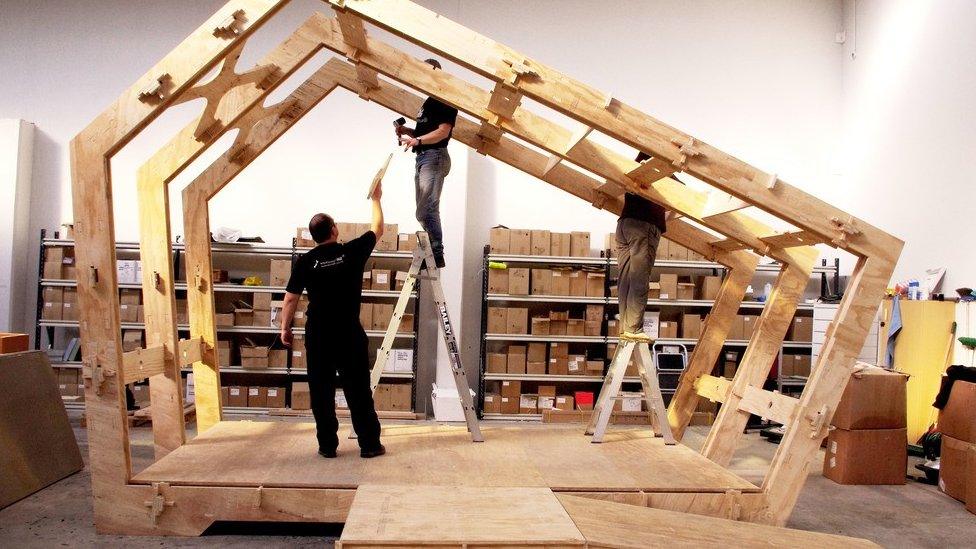
Social enterprise Space Craft Systems is building Wiki homes in New Zealand
Mr Parvin believes that digital technology could transform the way we design and build our homes and hopes that his project can do for buildings what Uber and AirBnB have done for the taxi and hotel industries respectively.
"There is something fundamentally wrong with our housing economy - our dependence on a few large development companies to buy the land, beat their way through local community resistance and build rows of poor quality, unsustainable mass housing that fewer and fewer of us can afford," said Mr Parvin.
"Every major urban economy now faces a huge housing challenge. It's not just about building enough homes but also about breaking our dependence on fossil fuels and debt."
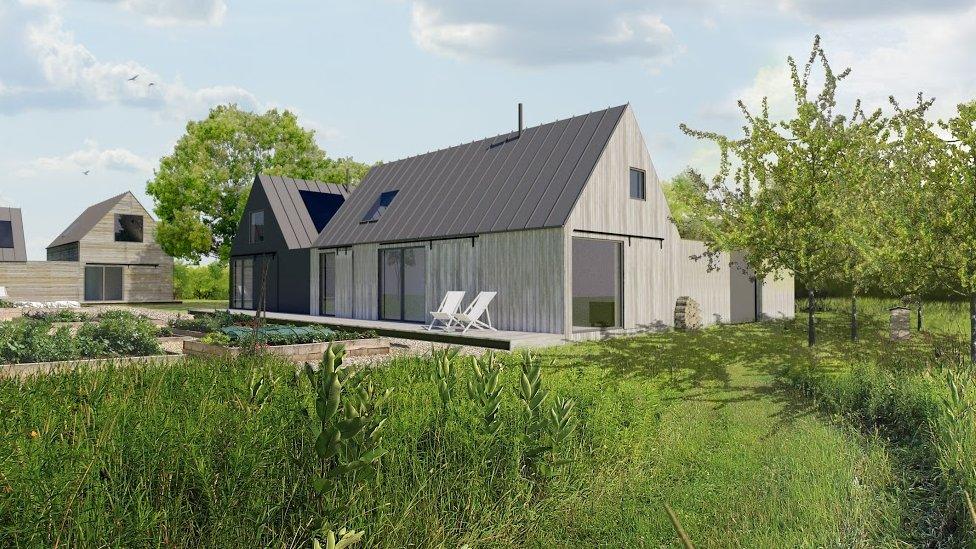
Can WikiHouse be the Uber of construction?
To draw up plans for their new home, users will visit the WikiHouse website (still under construction) and input some basic measurements such as the width and height, which algorithms will interpret and use to predict how much the project will cost and even how many screws it will need.
The components for the house will not be manufactured in centralised factories but by a distributed network of small businesses and community spaces where people get together to create things (maker-spaces).
"These micro-factories will be collectively one big factory rather like AirBnB is a huge hotel," said Mr Parvin.
Possible kits include studios (with an estimated build price of £12,000), micro houses (£45,000) and town houses (£150,000).
Much of the material is deliberately low-tech - timber frames that can be put together, said Mr Parvin "using tools you can buy in B&Q".


Tomorrow's Buildings

Of course what WikiHouse does not provide is the land to build on, but that too could be changing as cities increasingly run out of space.
DemoDev - a project set up specifically to find space for affordable housing - recently conducted a study using open data from the UK's second biggest city Birmingham.
It found that the local authority had 14 hectares of land distributed around the urban centre, albeit in tiny little plots.
The UK government seems to be acknowledging that self-build projects are an important part of the housing future and has committed to doubling the size of the self and custom-built housing sector which currently accounts for under 10% of the housing supply.
WikiHouse, Mr Parvin is keen to point out, is still a research project although it is beginning to see its first pilots in New Zealand, Europe and South Yorkshire.
Tiny home
MIT's gesture-controlled transforming unit is designed for small homes
Others are thinking, not about designing new homes but making the most out of the ones we have - which in urban areas, often means tiny apartments.
At the Massachusetts Institute of Technology's Changing Places lab they have come up with a technological solution known as CityHome.
The home in a box that is controlled by waving your hand at it looks, at first glance, like something Ikea would come up with if it was based at MIT's Media Lab.
The 200ft space has at its centre a box which contains a bed, dining room table, kitchen surface, cooker and storage.
Users can summon different elements of this through gesture, touch and voice control.
The whole unit can be moved a few feet each way to extend a room - so when you want the bedroom space, you effectively do away with the kitchen.
"Once you have shrunk an apartment, the only way to make it functional and liveable is to have space dynamically convert from one function to another," Prof Kent Larson, who leads the research, told the BBC.
"It is about giving people, especially young people, the chance to live in a part of the city which they are normally priced out of," he added.
After the video of CityHome went on YouTube, the team were inundated with enquiries from developers and, six months ago, created a start-up to build the furniture commercially.
Its designs are currently being piloted in existing apartments in Boston and feedback has been "largely positive", said Mr Larson.
The start-up is also in talks with around 20 developers about building such apartments from scratch.
Prof Larson believes that the concept can be extended to create smarter homes.
"We need to think of technology-enabled furniture as a platform for integrating other technology because in a small apartment it is not practical to put in conventional systems," he said.
As well as digital displays on walls, the platform could include lighting systems that change colour to help users sleep or wake, wireless sensors that monitor the occupant's health and teleconferencing capabilities.
"I don't believe in smart homes, I believe in dumb homes that you put smart things into. If smartness is embedded in the walls then your home becomes obsolete in five years time," said Prof Larson.
Car crisis

In Sao Paulo, commuters can spend up to three hours a day in their cars
However, not everyone believes that the solution to the urban housing crisis lies with technology.
In 2001, Brazilian designer Alexandre Lafer Frankel grew so exasperated with the traffic in Sao Paulo that he abandoned his car and started to think about how to solve the mobility crisis in his city.
"People spend three hours a day in their cars. There is no public transport in Sao Paulo and I wanted to created a better lifestyle in the city," he told the BBC.
The answer he came up with was to build tiny apartments (130 square feet in some cases) in the centre of the city, close to where people worked.
"People like to live and work in the same area and they are prepared to trade off a large apartment far away from the city for a small one in it," he said.
To compensate for the lack of space internally, each apartment has shared areas - cafes, gyms, storage for deliveries and rooms where users can borrow tools and other pieces of equipment they can't store in their homes. The apartments - which have a starting price of only £15,000 - even offer spare rooms for when relatives or friends come to visit.
They also have shared bike, car and motorcycle schemes running so, like Mr Frankel, residents can also give up their cars.
In the last six years, Vitacon, the construction firm he founded, has built and sold 10,000 apartments, suggesting that his gamble has paid off.
Now he is leading a campaign to extend the idea of small apartments that eliminate the need to own a car to other cities around the world.
- Published31 March 2016

- Published31 March 2016
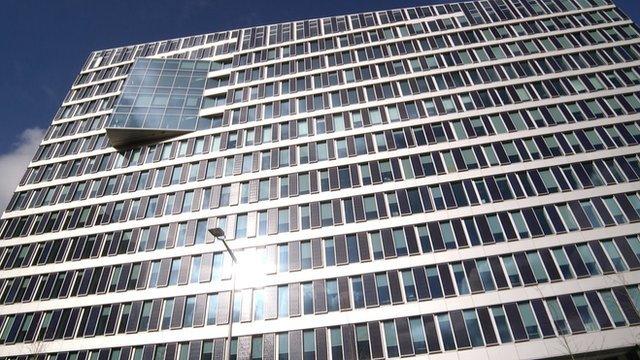
- Published2 October 2014
